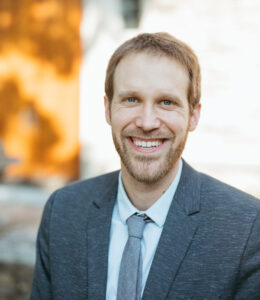Written by Rev. Aaron Stauffer, Ph.D.
 After a months-long intentional process of planning, recruiting, and gathering congregants to listen to one another about their core values and most pressing community issues, the church invited our local council member to hear what we discovered about our congregation and community. We had come a long way. As a member institution of the local Gamaliel affiliate, Nashville Organized for Action and Hope (NOAH), the congregation I attended had recently finished a listening campaign and was preparing to present its findings to the council member. So, when the pastor at our largely white Protestant church invited the congregation to the meeting, I was surprised to hear him say rather definitively, “Now, this is not a political meeting.” I could not believe my ears. “Why did you put it that way?” I later asked him. We were clear on what issues we wanted to present and more importantly, we were clear on why those values were so central to our faith. We had built relational power and we wanted to act. We wanted the council member to know we were paying attention. The pastor said in response that some in the congregation were worried that the council member might get the impression we were telling people to vote for a specific party. “That’s partisanship,” I said, “not politics.” More than that, politics is about the goods we hold in common and our life together — Christian faith is deeply concerned about that.
After a months-long intentional process of planning, recruiting, and gathering congregants to listen to one another about their core values and most pressing community issues, the church invited our local council member to hear what we discovered about our congregation and community. We had come a long way. As a member institution of the local Gamaliel affiliate, Nashville Organized for Action and Hope (NOAH), the congregation I attended had recently finished a listening campaign and was preparing to present its findings to the council member. So, when the pastor at our largely white Protestant church invited the congregation to the meeting, I was surprised to hear him say rather definitively, “Now, this is not a political meeting.” I could not believe my ears. “Why did you put it that way?” I later asked him. We were clear on what issues we wanted to present and more importantly, we were clear on why those values were so central to our faith. We had built relational power and we wanted to act. We wanted the council member to know we were paying attention. The pastor said in response that some in the congregation were worried that the council member might get the impression we were telling people to vote for a specific party. “That’s partisanship,” I said, “not politics.” More than that, politics is about the goods we hold in common and our life together — Christian faith is deeply concerned about that.
Christians and people of faith are often without clear responses for why it is important for them to bring their fundamental faith commitments to democratic politics. More than this, people of faith are without adequate resources to help them build an alternative political and economic reality — a reality that truly lives into the meaning of political, economic, and religious democracy. Stories like this are at the heart of my work at Vanderbilt Divinity School as the Louisville Institute Postdoctoral fellow, working with the Wendland-Cook Program.
The Wendland-Cook Program in Religion and Justice is an interdisciplinary program at Vanderbilt Divinity School. We focus on issues of justice that arise at the intersection of religion, economics, and ecology in an intersectional perspective. The program’s mission is to develop resources and opportunities for students, scholars, clergy, and activists to envision and create a more just and sustainable world. One way we do that is through a program called Solidarity Circles, virtual peer networks of faith leaders, clergy, organizers, and alternative media influencers who are engaged in the solidarity economy and its multiple connections to faith. Each year we work with dozens of faith communities across the country and globe to help them develop specific programs focused on the solidarity economy.
I am from a small, rural town in Kansas where I grew up attending church often, not because my family was particularly religious or pious — but because that was the center of community. For me and my family, the connections between church, politics, economics, and social life were always clear. Churches were community centers, soup kitchens, education spaces, hosts for public forums — they can be powerful institutions to help create the cooperative commonwealth. When I left small town Kansas for college I brought with me my deep concern for building deeper democratic culture. After college, I honed those skills as an organizer with the Industrial Area Foundations (IAF) in San Antonio, Texas, but found that I wanted a deeper theological vocabulary to help Christians and people of faith see how their religious life could help them build deeper democratic power. So, I went to seminary at Union Theological Seminary in the City of New York, where I eventually completed my PhD in theology and ethics, specializing in social ethics.
During my time in New York, I became the executive director of Religions for Peace USA, a national interfaith organization that led an anti-Islamophobia program here in the Southeast. That work put me in touch with diverse communities fighting anti-Muslim bigotry and white Christian nationalism. I built relationships and friendships for life that connect me with communities of struggle at the intersection of race, religion, and economic democracy. These sorts of relationships personalize racial, religious and economic struggles and help me connect them to my own reasons for prizing democracy in its various forms. It’s the people that keep you in the fight, struggling for deeper democracy, pressing for more rigorous analysis of what we’re collectively up against, and energizing me in constructing a beloved community comprised of political, economic, and religious democracy.